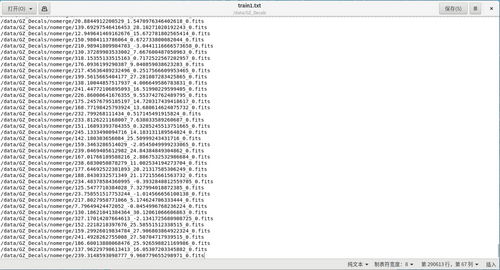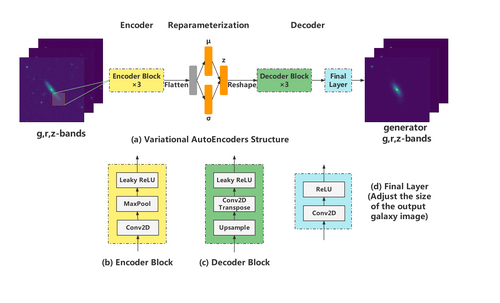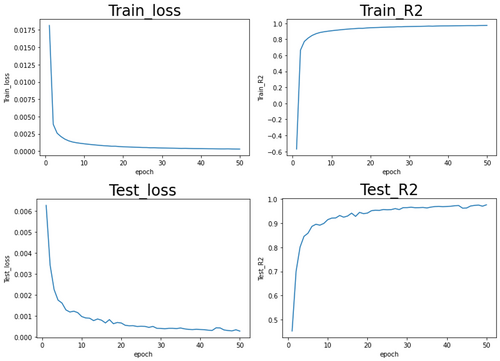“Auto clustering of galaxies after dimensionality reduction”的版本间差异
跳到导航
跳到搜索
无编辑摘要 |
无编辑摘要 |
||
| 第6行: | 第6行: | ||
==Datasets== |
==Datasets== |
||
*DECaLS |
|||
*In the first step, we first filter out the galaxy data with data shape [3*256*256], and save the galaxy data paths that match this shape into a text file, which constitutes our training set. As shown in the example of text in the figure below: |
*In the first step, we first filter out the galaxy data with data shape [3*256*256], and save the galaxy data paths that match this shape into a text file, which constitutes our training set. As shown in the example of text in the figure below: |
||
*From more than |
*From more than 300,000 data, 290613 galaxies data matching the shape conditions were selected. |
||
==VAE Method== |
==VAE Method== |
||
| 第15行: | 第16行: | ||
==Result== |
==Result== |
||
=== |
===Latent variable dimensional analysis=== |
||
| ⚫ | |||
*The above network fits the galaxy data to one parameter using a 2D convolutional neural network. The following are the training results for training a single parameter - star magnitude. |
|||
[[File:result_111.png|500px|right|jumengting]] |
[[File:result_111.png|500px|right|jumengting]] |
||
| ⚫ | |||
| ⚫ | |||
| ⚫ | |||
===Generate data Second Method=== |
===Generate data Second Method=== |
||
*Galsim result. |
*Galsim result. |
||
| 第27行: | 第32行: | ||
| ⚫ | |||
| ⚫ | |||
[[File:下载11.png|500px|center]] |
|||
| ⚫ | |||
[[File:x123.png|500px|center]] |
|||
[[File:x124.png|500px|center]] |
|||
[[File:x125.png|500px|center]] |
|||
[[File:x126.png|500px|center]] |
|||
[[File:x127.png|500px|center]] |
|||
[[File:x128.png|500px|center]] |
|||
| ⚫ | |||
| ⚫ | |||
| ⚫ | |||
2022年10月1日 (六) 08:36的版本
Introduction
- This work is divided into two parts.
- The first part is to reduce the dimension of Galaxy data to low dimensional space with VAE.
Datasets
- DECaLS
- In the first step, we first filter out the galaxy data with data shape [3*256*256], and save the galaxy data paths that match this shape into a text file, which constitutes our training set. As shown in the example of text in the figure below:
- From more than 300,000 data, 290613 galaxies data matching the shape conditions were selected.
VAE Method
- The neural network of VAE structure is constructed as follows:
Result
Latent variable dimensional analysis
- The number of latent space dimensions is set, and the neural network is used to perform gradient descent fitting to the appropriate case and observe the losses. The following figure represents the losses of different latent space dimensions corresponding to training 100 epochs:
- The following are the different representations in different latent spaces:
- The higher the dimensionality of the latent variable, the more information in the high-dimensional space it can represent, and the better the quality of the reconstructed image.
- The above is the first stage.
Generate data Second Method
- Galsim result.
Ground-Truth data Second Method
- CANDELS
Else
Waiting...
The address of the data is as follows: http://202.127.29.3/~shen/VAE/


